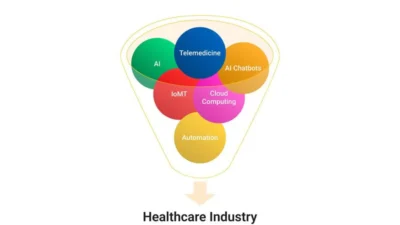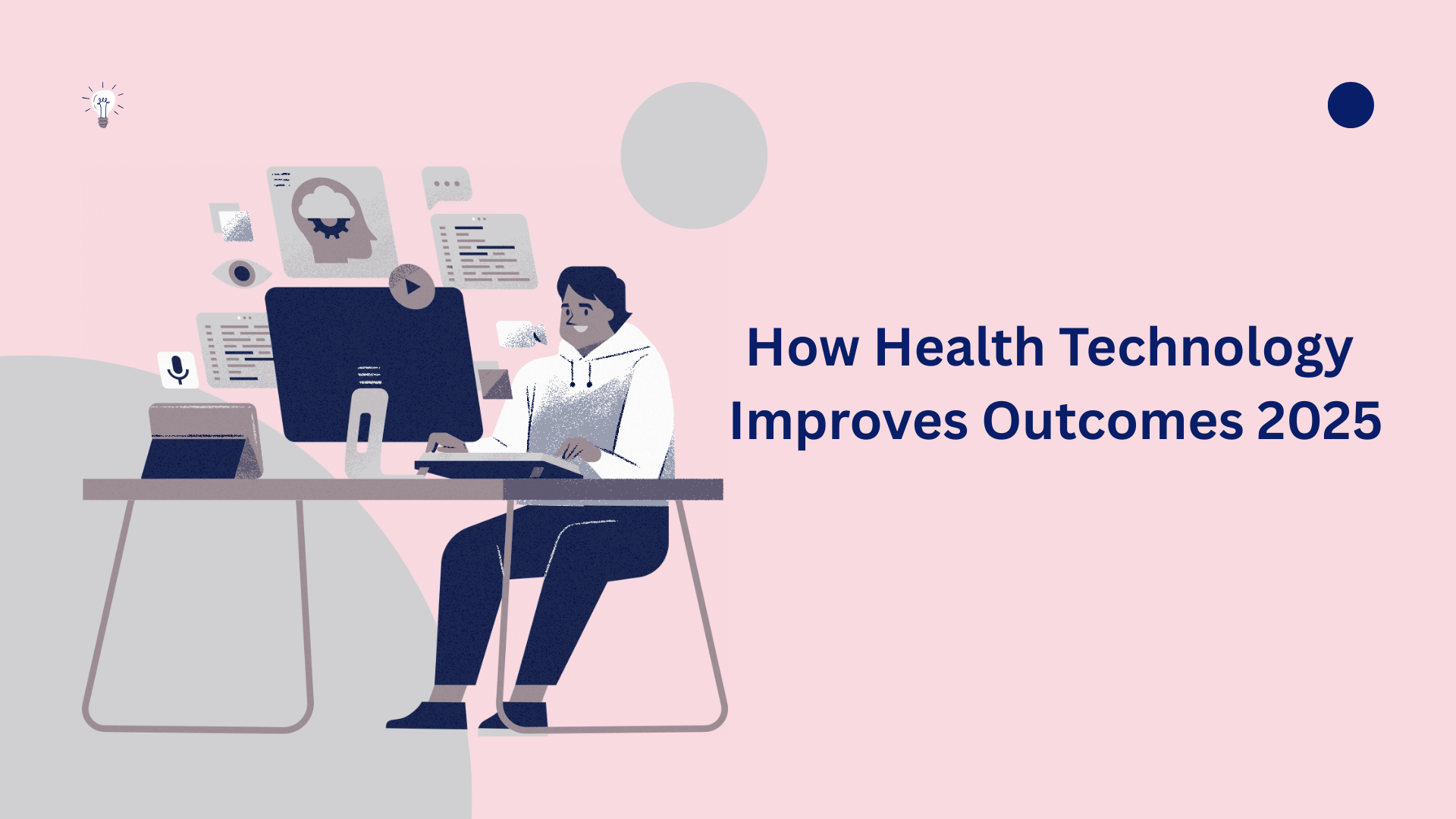Introduction: A Health Revolution Awaits
Has it ever occurred to you that your smartwatch might save your life? Imagine this: A ping from Sarah’s wearable alerts the 65-year-old retiree to an irregular heartbeat. Before a possible heart attack, she schedules a telehealth consultation, receives a diagnosis of atrial fibrillation, and begins treatment. That is the application of health technology! Health technology is changing people’s lives at all ages, from apps that remind you to drink water to AI that can detect cancer. The global health tech market grew faster than your neighbor’s TikTok following, reaching $600 billion in 2023.
This blog explores in detail how health technology enhances results by making healthcare more intelligent, efficient, and easily accessible. Health tech can help, whether you’re a senior learning telehealth or a teenager tracking their steps. Are you prepared to investigate this revolution? Let’s explore the world of health technology while enjoying a cup of coffee!
What Is Health Technology?
Defining Health Tech
Tools, equipment, and systems intended to improve patient outcomes, diagnosis, and healthcare delivery are collectively referred to as health technology, or “health tech.” Consider electronic health records (EHRs), telemedicine platforms, smartwatches, and AI diagnostics. By bridging the gap between patients and providers, these innovations provide effective, individualized care. Health technology empowers everyone from physicians to patients by enhancing the quality, safety, and efficiency of healthcare systems, claims HealthIT.gov.
Evolution of Health Tech
From cumbersome stethoscopes to AI-powered imaging systems, health technology has advanced. While doctors used simple tools in the 19th century, we now have robots that help with surgeries and apps that remind us to stay hydrated. Real-time data sharing and remote care are now possible thanks to the explosion of 5G, cloud computing, and IoT (Internet of Things). According to McKinsey, telehealth adoption increased by 154% in 2020 alone. Not only is health technology futuristic, but it is also changing healthcare today.
Read more: How technology can monitor and improve our health
Key Components of Health Tech
Health tech includes:
-
Wearables: Devices like Fitbit track vitals.
-
Telemedicine: Virtual doctor visits via Zoom-like platforms.
-
AI and Machine Learning: Tools for diagnostics and predictive analytics.
-
EHRs: Digital records for seamless data sharing.
-
Robotics: Precision tools for surgeries.
These components work together to make healthcare proactive, accessible, and efficient, improving outcomes for all.
How Health Tech Enhances Patient Care
Telemedicine: Care at Your Fingertips
Bid farewell to scratchy hospital gowns and lengthy waits! You can save time and hassle by using video calls to consult doctors thanks to telemedicine. According to CDC data, 80% of Americans used telehealth in 2022. This is a lifeline for working parents or families in rural areas. For diseases like diabetes or hypertension, health technology guarantees professional care from the comfort of your couch, cutting down on delays and enhancing results.
Wearables: Your Health, Tracked
Fitness trackers and smartwatches are more than just step counters. Heart rate, sleep habits, and even blood oxygen levels are tracked by gadgets such as the Apple Watch. 60% of wearables users were able to identify early health problems, such as arrhythmias, according to a 2021 study. Imagine being prodded to visit a physician before an issue worsens! One ping at a time, health technology gives you the power to take control of your well-being.
AI in Diagnosis: Smarter, Faster
AI can identify patterns that humans miss, making it healthcare’s Sherlock Holmes. Google’s DeepMind AI, for instance, has a 94% accuracy rate in identifying eye conditions. It speeds up the diagnosis of diseases like cancer and Alzheimer’s, analyzes medical images, and forecasts risks. Health technology improves care effectiveness by preventing complications, saving lives, and lowering treatment costs by identifying problems early.
Personalized Medicine: Tailored Care
Health technology adopts a one-size-fits-all strategy and discards it. AI-powered analytics and genetic testing produce individualized treatment regimens. Apps such as 23andMe, for example, use DNA analysis to suggest drugs or lifestyle modifications. Treatment success rates are increased by this accuracy, particularly for long-term conditions like diabetes. Care is tailored to you, not just the typical patient, thanks to health technology.

Health Tech Boosts Efficiency
Electronic Health Records (EHRs)
Have you ever attempted to read a doctor’s handwritten notes? By digitally storing patient data, EHRs remove that confusion. Instant access to your medical history helps doctors make fewer mistakes and provide care more quickly. EHRs reduced medication errors by 50%, according to a 2020 study. Workflows are streamlined by health technology, allowing providers to concentrate on healing rather than finding files.
Robotics in Surgery
Although it sounds like science fiction, robotic surgery is amazing and real. By reducing incisions and recovery times, systems such as the da Vinci robot allow surgeons to operate with superhuman precision. Robotic surgery patients frequently have fewer complications and leave the hospital a few days sooner. Health technology is transforming operating rooms all over the world by making complicated procedures safer, quicker, and more efficient.
Health Apps: Streamlined Wellness
You can think of health apps as personal wellness assistants. While some apps, like Headspace, provide mental health guidance, others, like MyFitnessPal, track diet. These tools help you stay on course by giving you real-time feedback, tips, and reminders. 70% of app users reported adopting healthier habits, according to a 2022 survey. Wellness is made easier by health technology, which integrates it into your everyday activities.
Health Tech for All Ages
Kids and Teens: Gamified Health
Games are fun for kids and teens, and health technology makes wellness enjoyable. Diabetes management is gamified by apps like My Sugr, which reward children for monitoring their blood sugar levels. Fitbit Ace and other wearables use leaderboards and challenges to promote exercise. Health technology prevents problems like obesity and mental health issues by involving younger generations and fostering healthy habits that last a lifetime.
Adults: Managing Chronic Conditions
For adults juggling work, family, and health, tech is a lifesaver. Apps like Livongo monitor blood pressure or glucose, offering real-time advice. Telehealth connects you to specialists without missing a meeting. A 2021 study found 65% of adults using health tech had better control over chronic conditions like hypertension. Health technology keeps adults proactive and healthy.
Read more: Health care technology trends 2025: AI benefits, wearable use …
Seniors: Aging with Ease
Seniors are embracing health technology like never before. Smart pill dispensers remind them to take meds, while fall-detection devices like Lively alert caregivers instantly. A 2022 report found 70% of seniors using health tech felt more independent. From telehealth check-ins to wearable monitors, health tech supports aging with dignity and ease.
Families: Coordinated Care
Health tech isn’t just for individuals—it unites families. Apps like CaringBridge let families coordinate care for loved ones, sharing updates and schedules. Wearables sync data to family members’ devices, ensuring everyone stays informed. Health technology fosters collaboration, making caregiving less stressful and more effective for families of all ages.
Challenges of Health Technology
Data Privacy Concerns
Health tech collects sensitive data—heart rates, diagnoses, even DNA. In 2023, over 100 million health records were exposed globally, raising alarms. Encryption and regulations like HIPAA help, but breaches happen. Health technology thrives on trust, so always choose reputable apps and devices, and read privacy policies before sharing data.
Cost and Accessibility
Not everyone can afford a $400 smartwatch or reliable internet for telehealth. Rural areas often lack 5G or broadband, limiting access. While some apps are free, premium features often require subscriptions. Governments and companies are working to close this gap, but affordability remains a challenge. Health technology must evolve to reach all incomes and regions.
Learning Curve for Users
Tech can be intimidating, especially for seniors or those new to gadgets. Navigating apps or wearables takes time, and not every doctor is tech-savvy either. Training programs and user-friendly designs are improving, but the learning curve persists. Health technology must prioritize simplicity to ensure everyone can benefit.

The Future of Health Technology
AI and Predictive Analytics
The future of health technology is mind-blowing. AI will predict heart attacks or diabetes years in advance by analyzing lifestyle and genetic data. Predictive analytics could reduce hospital admissions by 30%, per a 2023 study. Health tech will shift from reactive to proactive, catching issues before they start.
3D Printing in Healthcare
Imagine printing a new kidney! 3D printing is already creating prosthetics and surgical models. Soon, it could produce organs or tissue, solving transplant shortages. This health technology promises faster recoveries and personalized implants, revolutionizing care for patients with severe injuries or chronic conditions.
Blockchain for Data Security
Blockchain could be health tech’s superhero for data privacy. By creating secure, decentralized records, it prevents breaches and ensures only authorized users access your data. As health technology grows, blockchain will build trust, making patients feel safe sharing sensitive information with providers.
Read more: Top App Lockers for Android Users: Secure Your Apps 2025
Conclusion: Embrace the Health Tech Wave
Healthcare is undergoing a revolution thanks to health technology, which is providing all ages with faster, more intelligent, and more individualized care. These technologies, which range from wearables that detect early warning signs to AI that accurately diagnoses illnesses, save lives and give us the ability to take control of our health. Robotics improves surgery, telemedicine removes barriers, and apps make health enjoyable for children and easy for adults to handle.
The future of health technology is bright, even with obstacles like privacy issues and expenses—imagine 3D-printed organs and predictive AI. Are you prepared to ride this wave? Consult your physician, research health technology, and share your experience in the space provided below. We’d love to hear how health technology has changed your life, so please share your thoughts in the comments section!
FAQs
1. How does health technology improve patient outcomes?
Health technology enhances outcomes through early diagnosis, personalized care, and remote monitoring. AI detects diseases faster, wearables track vitals, and telemedicine improves access. This reduces complications, hospital stays, and costs, ensuring better health for kids, adults, and seniors alike.
2. Is health technology safe to use?
Generally, yes, but vigilance is key. Health tech uses encryption and regulations like HIPAA to protect data. Choose reputable devices, review privacy policies, and consult providers to ensure safety. Regular software updates also help safeguard against breaches in health technology.
3. Can health technology help seniors?
Definitely! Smart pill dispensers, fall-detection devices, and telehealth support seniors’ independence. A 2022 study found 70% of seniors using health tech felt more confident. These tools reduce hospital visits and help seniors manage chronic conditions with ease.
4. What are the costs of health technology?
Costs vary widely—smartwatches range from $50 to $400, while telehealth may be covered by insurance. Some apps are free, but premium features often require subscriptions. Check with providers or explore free health tech options for affordable solutions.
5. How does AI contribute to health technology?
AI analyzes medical images, predicts risks, and personalizes treatments. It detects conditions like cancer with 94% accuracy, per Google’s DeepMind. By catching issues early and reducing errors, AI-driven health technology improves outcomes and saves lives across all ages.

